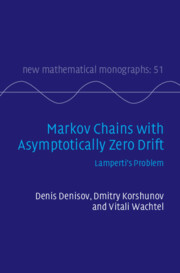Refine search
Actions for selected content:
2 results
2 - Lyapunov Functions and Classification of Markov Chains
-
- Book:
- Markov Chains with Asymptotically Zero Drift
- Published online:
- 24 April 2025
- Print publication:
- 08 May 2025, pp 41-87
-
- Chapter
- Export citation

Markov Chains with Asymptotically Zero Drift
- Lamperti's Problem
-
- Published online:
- 24 April 2025
- Print publication:
- 08 May 2025
